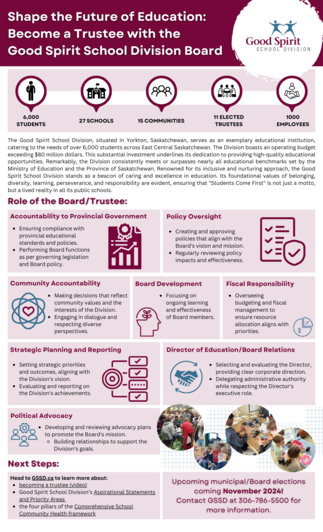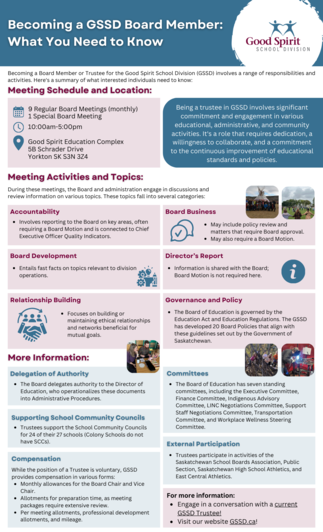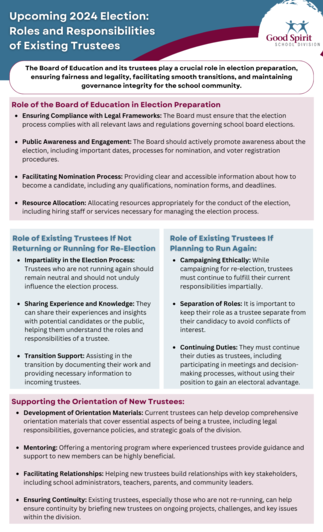
Shape the Future of Education: Become a Trustee with the Good Spirit School Division Board
The Good Spirit School Division, situated in Yorkton, Saskatchewan, serves as an exemplary educational institution, catering to the needs of over 6,000 students across East Central Saskatchewan. Operating 27 schools in 15 communities, the Division is overseen by 11 elected trustees, demonstrating a commitment to democratic governance in education. Employing nearly 1,000 dedicated permanent and part-time staff members, the Division boasts an operating budget exceeding $80 million dollars. This substantial investment underlines its dedication to providing top-notch educational opportunities. Remarkably, the Division consistently meets or surpasses nearly all educational benchmarks set by the Ministry of Education and the Province of Saskatchewan. Renowned for its inclusive and nurturing approach, the Good Spirit School Division stands as a beacon of caring and excellence in education. Its foundational values of belonging, diversity, learning, perseverance, and responsibility are evident, ensuring that "Students Come First" is not just a motto, but a lived reality in all its public schools.
Core Values of GSSD
- Belonging: Promote an inclusive environment where everyone feels valued.
- Diversity: Celebrate the unique contributions of everyone in the division.
- Learning: Foster innovative educational opportunities.
- Perseverance: Support an environment conducive to learning and growth.
- Responsibility: Uphold the Foundational Statements and strive for excellence.
Role of the Board/Trustee
- Accountability to Provincial Government
- Ensuring compliance with provincial educational standards and policies.
- Performing Board functions as per governing legislation and Board policy.
- Community Accountability
- Making decisions that reflect community values and the interests of the Division.
- Engaging in dialogue and respecting diverse perspectives.
- Strategic Planning and Reporting
- Setting strategic priorities and outcomes, aligning with the Division's vision.
- Evaluating and reporting on the Division's achievements.
- Policy Oversight
- Creating and approving policies that align with the Board's vision and mission.
- Regularly reviewing policy impacts and effectiveness.
- Director of Education/Board Relations
- Selecting and evaluating the Director, providing clear corporate direction.
- Delegating administrative authority while respecting the Director's executive role.
- Political Advocacy
- Building relationships to support the Division’s goals.
- Developing and reviewing advocacy plans to promote the Board's mission.
- Board Development
- Focusing on ongoing learning and effectiveness of Board members.
- Fiscal Responsibility
- Overseeing budgeting and fiscal management to ensure resource allocation aligns with priorities.

Becoming a GSSD Board Member: What You Need to Know
Being a trustee in GSSD involves significant commitment and engagement in various educational, administrative, and community activities. It's a role that requires dedication, a willingness to collaborate, and a commitment to the continuous improvement of educational standards and policies. Here's a summary of what interested individuals need to know:
Meeting Schedule and Location:
GSSD typically holds nine regular board meetings and one special board meeting each year. These meetings are usually conducted at the Good Spirit Education Complex from 10:00 am to 5:00 pm.
Meeting Activities and Topics:
During these meetings, the Board and administration engage in discussions and review information on various topics. These topics fall into several categories:
- Accountability: Involves reporting to the Board on key areas, often requiring a Board Motion and is connected to CEO Quality Indicators.
- Board Business: May include policy review and matters that require Board approval. May also require a Board Motion.
- Board Development: Entails fast facts on topics relevant to division operations.
- Director’s Report: Information is shared with the Board; Board Motion is not required here.
- Relationship Building: Focuses on building or maintaining ethical relationships and networks beneficial for mutual goals.
- Governance and Policy: The Board of Education is governed by the Education Act and Education Regulations. The GSSD has developed 20 Board Policies that align with these guidelines set out by the Government of Saskatchewan.
Delegation of Authority:
The Board delegates authority to the Director of Education, who operationalizes these documents into Administrative Procedures.
Committees:
The Board of Education has seven standing committees, including the Executive Committee, Finance Committee, Indigenous Advisory Committee, LINC Negotiations Committee, Support Staff Negotiations Committee, Transportation Committee, and Workplace Wellness Steering Committee.
Supporting School Community Councils:
Trustees support the School Community Councils for 24 of their 27 schools (Colony Schools do not have SCCs).
External Participation:
Trustees participate in activities of the Saskatchewan School Boards Association, Public Section, Saskatchewan High School Athletics, and East Central Athletics.
Compensation:
While the position of a Trustee is voluntary, GSSD provides compensation in various forms:
- Monthly allowances for the Board Chair and Vice Chair.
- Allotments for preparation time, as meeting packages require extensive review.
- Per meeting allotments, professional development allotments, and mileage.
For more information:
- Engage in a conversation with a current GSSD Trustee!

Upcoming 2024 Election: Roles and Responsibilities of Existing Trustees
The Board of Education plays a crucial role in preparing for Board elections, including those scheduled for November 2024. The responsibilities and roles of existing trustees can vary based on whether they are running for re-election or stepping down.
Role of the Board of Education in Election Preparation
- Ensuring Compliance with Legal Frameworks: The Board must ensure that the election process complies with all relevant laws and regulations governing school board elections.
- Public Awareness and Engagement: The Board should actively promote awareness about the election, including important dates, processes for nomination, and voter registration procedures. This could involve community meetings, informational materials, and social media campaigns.
- Facilitating Nomination Process: Providing clear and accessible information about how to become a candidate, including any qualifications, nomination forms, and deadlines.
- Resource Allocation: Allocating resources appropriately for the conduct of the election, including hiring staff or services necessary for managing the election process.
Role of Existing Trustees If Not Returning or Running for Re-Election
- Impartiality in the Election Process: Trustees who are not running again should remain neutral and should not unduly influence the election process.
- Sharing Experience and Knowledge: They can share their experiences and insights with potential candidates or the public, helping them understand the roles and responsibilities of a trustee.
- Transition Support: Assisting in the transition by documenting their work and providing necessary information to incoming trustees.
Role of Existing Trustees If Planning to Run Again:
- Campaigning Ethically: While campaigning for re-election, trustees must continue to fulfill their current responsibilities impartially.
- Separation of Roles: It is important to keep their role as a trustee separate from their candidacy to avoid conflicts of interest.
- Continuing Duties: They must continue their duties as trustees, including participating in meetings and decision-making processes, without using their position to gain an electoral advantage.
Supporting the Orientation of New Trustees:
- Development of Orientation Materials: Current trustees can help develop comprehensive orientation materials that cover essential aspects of being a trustee, including legal responsibilities, governance policies, and strategic goals of the division.
- Mentoring: Offering a mentoring program where experienced trustees provide guidance and support to new members can be highly beneficial.
- Facilitating Relationships: Helping new trustees build relationships with key stakeholders, including school administrators, teachers, parents, and community leaders.
- Ensuring Continuity: Existing trustees, especially those who are not re-running, can help ensure continuity by briefing new trustees on ongoing projects, challenges, and key issues within the division.
The Board of Education and its trustees have a multifaceted role in preparing for elections. This involves ensuring a fair and lawful election process, supporting the transition to new trustees, and balancing their responsibilities and roles, whether they are re-running or not. The focus should always be on maintaining the integrity of the electoral process and ensuring the smooth continuation of governance for the benefit of the school community.
Board Resources
GSSD Board Orientation Booklet, 2020
Public School Boards of Saskatchewan
Saskatchewan School Boards Association
School Division Administration Regulations








